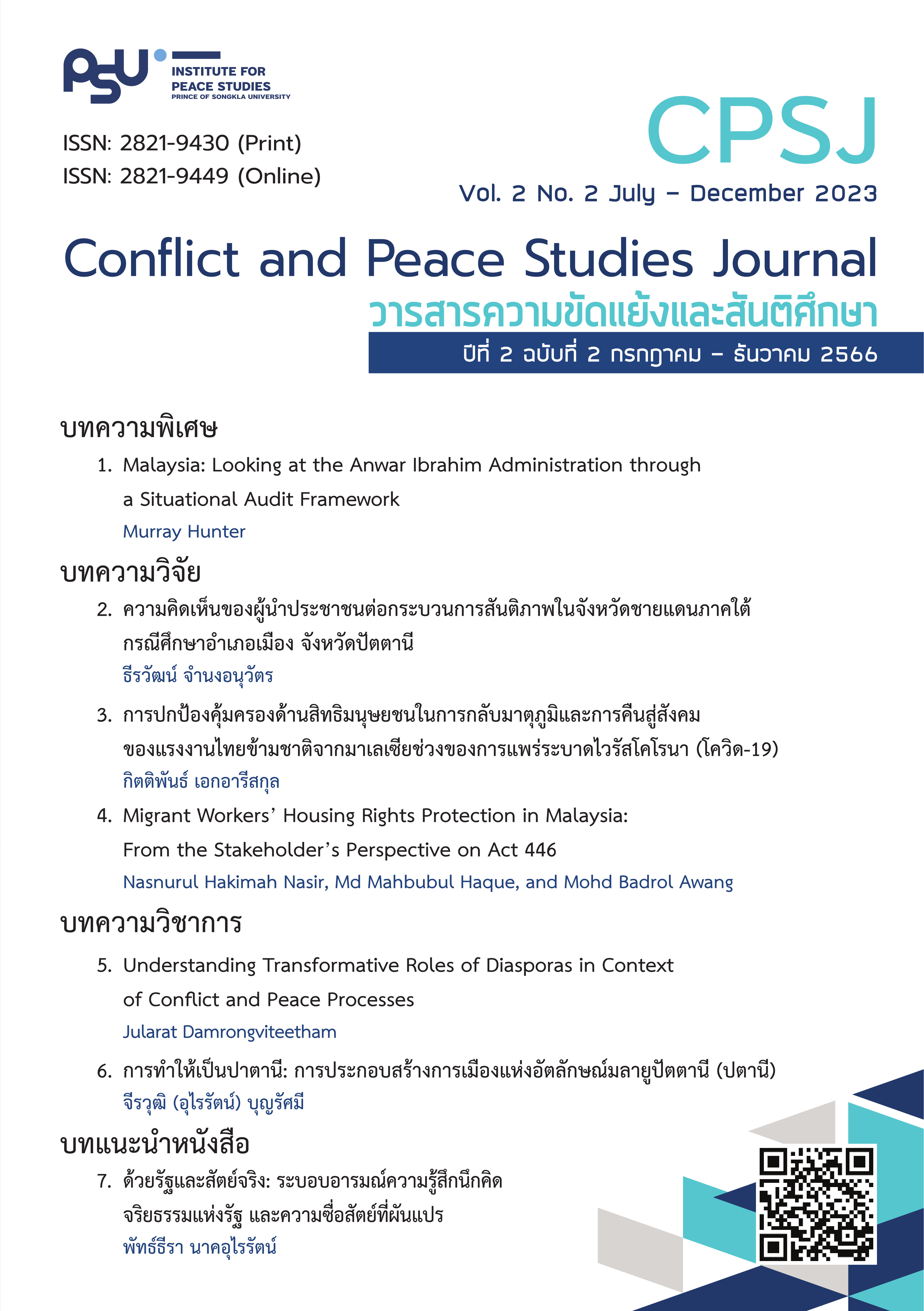Patanisation: Constructing Melayu Patani’s Identity Politics
Main Article Content
Abstract
Thailand has been experiencing the “Southern Insurgency” since 2004. Its causes are still an issue of debate. This article aims to examine those causes of violence against the Thai state. This study suggests that the process of constructing the Melayu Patani identity (referred to as ‘Patanisation’) has played a primary role in encouraging several local Malays to support Patani's independence movement. This has resulted in turning both Malays and local Thais against the Thai state, which they see as its enemy. Moreover, this article will demonstrate that the process of ‘Patanisation’ was only established recently, circa 1997, and based on nothing but irrationality. For example, it utilized Patani’s historiography and the claim of some parts of Songkhla province (Chana, Thepa, Natawi, Sabayoi, and Satun) to be the annexed territories of Patani. In fact, those districts share nothing with Patani and their cultures and histories are significantly different.
Article Details
References
Al-Fatoni, A. (2000). History of Pattani. Institution of Nusantara Prince of Songkhla University Press.
Anantapak, A. (2014). Sultanate of Singora. Gypsy Group.
Aphornsuvan, T. (2006). History of separation theory in Deep south of Thailand. Thammasat Press.
Arjaan-Bangnara. (1980). Pattani in the past. (no publisher).
Benar News. (2015). MARA PATANI in Kuala Lumpur 27 September 2015. Retrieved December 25, 2022, from https://www.benarnews.org/thai/news/TH-TALK-MARA-08272015082313.html
Binji, A. (1998). Langkasuka – Patani Darussalam. Centre of Deep south of Thailand.
Binji, A. (2015). Patani: History and Malay Politics. Foundation of Southern Thailand’s Islam.
Binji, A. (2019). Description of Berjihad di Patani. Wikaya Press.
Boonratsamee, J. (2020). PA-TA-NI: Manufacturing of Patani’s historical identity. Fah Deaw Kan, 18(3), 75-107.
Chalermsripinyorat, R. (2017). Decoding the thoughts of Patani’s separatists. Deepbooks.
Chalermsripinyorat, R. (2020). Jihad for Patani: Islam and BRN’s Separatist Struggle on Southern Thailand. (PhD'sThesis). The Australian National University.
Deep South Watch. (2007). Psychological warfare: a prolonged war. Kledthai.
Eco, U. (2011). Inventing the Enemy. Harper.
Info Japem. (2013). Patani and Anglo-Siam Treaty 1909. Info Japem, 1(4), 5.
Information Bureau of National Liberation Front of Patani. (1976). Voice of Patani. (11 February 1976).
Internal Security Operations Command (ISOC). (2009). Lessons from fighting in Deep South 2009. ISOC.
Jantawirooj, K. (1979). I am whom knowing Pak Yek well. Wittawat Press.
Jantawirooj, K. (1980). PULO: An organisation of Republic of Patani. Wittawat Press.
Jantimatorn, S. (2005). Guerrilla warfare in the city. Matichon.
Jitpiromsri, S. (2020). Governance and Conflict Resolution of Thailand’s Deep South/Patani. PSU Press.
Kaldor, M. (2012). Old and New war. Polity Press.
Kobkua Suwannathat-Pian. Historical Identity, Nationality, Nation-Building, and Historical Writing on the Malay Muslims of South Thailand 1940s-1980s. In Patrick Jory and Jirawat Seangthong (Ed.), The Phantasm in Southern Thailand: Historical writings on Patani and the Islamic World (p. 373-395). Chulalongkorn University.
Koommeka, T. (2015). Patani Vs 3 provinces of deep south: Politics of naming. Retrieved December 25, 2022, from https://prachatai.com/journal/2015/09/61358
Ku-Jik. (1928). History of Patani. n.p.
McCargo, D. (2019). Tearing apart the land: Islam and legitimacy in Southern Thailand. Kobfai.
Mongkolworawan. P. (2016). Studying of Patani’s history: Its Status, Obstacles and Problems. In Suphamet Yunyasit (Ed.), Studying about status of Deep South of Thailand’s history. (p. 92-119). Institute of Human Rights and Peace Studies of Mahidol University.
Naun-plean, P. (2008). Thainess and Malayness with politics of the Othering. In Parinya Naun-plean (Ed.), Out of the definition of Thainess. (p. 7-17). Centre of Songkhla basin Press.
Panjor, R. (2009). Hijab and Kerisik: History of Patani in recently day and the losing of political negotiation. In Patrick Jory and Jirawat Seangthong (Ed.), The Phantasm in Southern Thailand: Historical writings on Patani and the Islamic World (p. 212-253). Chulalongkorn University.
Panjor, R. (2015). Politics of words in Pa(t)tani: constructing “peace” in ethnopolitical conflict. (Master's Thesis). Thammasat University.
Perkasa, K. (2010). Patani Behind the Accidental Boarder: The Search for Elusive Peace. Orion Solutions.
Phetchajumrat, P. (1976). Uncovering southern emergency. Boonjitti Press.
Puaksom, D. (2019). Patani’s historiography in warfare. In Patrick Jory (Ed.), Thai South and Malay North: Ethnic Interactions on a Plural Peninsula (p. 82-105). Walailak University Press.
Saleh, R. (2008). New relations: Buddhists and Muslims in Deep South provinces. In Chaiwat Satha-Anan (Ed.), Imaginary land (p. 342-396). Matichon.
Sama-Ali, W. (2008). Project of Patani-Thai’s Dictionary for preliminary education and communication. Thailand Science Research and Innovation.
Songsiri, W. (2016). Tani: The forgotten Malay Muslims. Retrieved December 25, 2022, from http://lekprapai.org/home/view.php?id=131.
Tamthai, M. (2020). Weaving Patani’s Dream Non-violently. Thailand Science Research and Innovation.
Tawan Mai. (1980). The war of religion, Tawan Mai, 3(124), 10-17.
Textbook Foundation. (2008). History of Pattani: Past and Present day. Textbook Foundation.
Thai Muslim youth. (1976). 10th Report of Thai Muslim youth. Thai Muslim youth.
Thailand’s Royal Academy. (2010). Handbook of a Thai based Writing System for Malayu Patani. Sahamit Printing.
The Citizen. (2015). Knowing MARA PATANI. Retrieved December 25, 2022, from https://thecitizen.plus/node/11620.
Thong-In, A. (2019). Definition of “Red zone” in Patani/Deep South. The Third National Conference on Public Affairs Management in the Digital Era, Public Affairs Management in the Digital Era: Legal, Justice and A Return to Democracy (p. 451-459). School of Governance University of Khonkaen.
Wongtanee, C. (2011). Malay Bangkok/Nayu Bakoh: The adventure in Siam, Rubaiyat, 2(3), 402-473.

